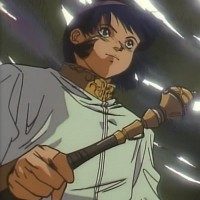
The Cleric is one of the four core classes of Advanced Dungeons & Dragons 1st Edition.
Unlike the Fighter and the Magic-User, the Cleric is not the broad archetype put into a playable form. It is "Van Hellsing: The Class".
(I have an entire post about how the Cleric came to be, and why it's not Generic Priest Class; read it here. I will not repeat myself.)
The Cleric As A Character
The Cleric is an ordained priest and a trained combatant, reflected by his D8 Hit Die, allowed weapons and armor, Attack Matrix, Turning, and spell access. He is not some guy doing ritual work in a shrine or temple that part-times as a beatstick; he is someone recruited to a particular calling within an organized faith tradition, initiated into a priesthood backed by a significant education, and trained to be militant about it.
The Cleric is required to serve a god. He is required to act on that god's behalf, and this mission informs the Cleric's decisions on what to do and how to do it. His is not a mind aiming for worldly glory, and the better ones are not concerned with personal elevation in worldly eyes. This is reflected in the Wisdom score requirement, and the effect that Wisdom has on their ability to access and use Clerical magic.

Due to his spell access and high Wisdom score, the Cleric tends think in terms of his god's interests first and foremost.
In practical terms, this means securing his god's worshippers from rivals, enemies, and more animalistic predators. In spiritual terms, this means proving by deed the validity of his creed and patron.
In Christian terms, this is giving witness and spreading the Good Word; in pagan terms, this means proving the gods--and thus the myths--of his people true and those of others false, in a relationship that more resemble Patron-Client binds than anything else. Clerics, therefore, are incentivized to be militant- and that militancy is often literal.
Most races in the Player's Handbook other than Men either cannot be Player-Character Clerics, or have a level limit below Name Level; this points to Men having a particular and favorable relationship to the divine that demi-humans and half-breeds lack, and such patronage has tangible benefits. Non-human Clerics are far more likely to be multi-classed than not accordingly.
The Cleric As A Patron

After the Fighter, the Cleric is most likely to explicitly seek to establish dominion over an area directly. At 8th level a Cleric automatically attracts zealous followers upon establishing a place of worship (i.e. a shrine, temple, cathedral, etc.); this escalates at 9th to the benefits of building that place into a stronghold held in the god's name.
The Cleric may not command armies by his own hand, but being a man of supernatural potency and divinely-bestowed authority means that he'll have no trouble attracting Fighters to be his Henchmen or in procuring Captains and their subordinates to lead men to holy war.
He also has clear motivation to foster relations with capable adventurers to address concerns that neither he nor his subordinates are able to do themselves. If he gets into spell research and item creation--and making his place of worship, via item creation, into a Place Of Power means doing that--he will certainly have reason to hand out quests to friendly adventurers to retrive particular components while he focuses on the research or enchanting process.
Clerics, even of evil gods, are so incentivized to act in this manner; the logistics required to expand the worldly influence and power of a god is not a trivial manner, as many religions find out the hard way.
Conclusions

The Cleric is a driver of campaign development. His mission to serve his god compells him to put down threats to his god's interests, safeguard his god's worshippers, and become the authority speaking for his god in the realm. His personal glory is irrelevant, whether he wants it to be or not; what matters is that his god's power and influence increase and those opposed are diminished or destroyed.
His ability to Turn Undead and use magic exists only to further this mission. His ability to wear armor, use shields, wield useful weapons and enjoy greater ability to use magic in combat (e.g. sanctuary to assist allies in close quarters). His value as a Patron and his ability to control Domains directly increases the ability to receive divine succor, often in return for rendering service to him, and even most evil gods are sufficiently pro-social to want the areas under their control to be free of external threats.
He is not a plate-armoed healbot. He is not just a walking magic Febreeze can to spray at undead. He is an agent of a greater power, and the nature of that power defines the nature of his actions in the campaign. This fact will go on to be true of the sub-classes of the Cleric that came into the game later, such as the Druid and Shugenja. Clerical Domains are going to be far outsized in their influence because of this mission focus unifying its population behind a single will, especially when hostiles are within reach.

No comments:
Post a Comment
Anonymous comments are banned. Pick a name, and "Unknown" (et. al.) doesn't count.